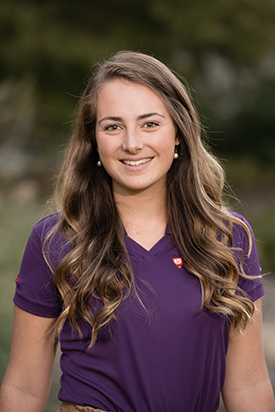 Co-op Ambassador:
Co-op Ambassador:
Anya Housianitis
Major: Industrial Engineering
Graduation Date: May 2018
Co-op Company: C.R. Band
Why did you decide to co-op?
I decided to co-op because I knew it would give me a competitive advantage when applying for jobs after graduation. I knew that having real-world experience would be appealing to potential employers and I would learn a lot from the experience. I was quite confident in my choice of major, but co-oping reaffirmed that I do want to become an Industrial Engineer.
What types of projects did you work on?
The majority of the project I worked on involved Lean Manufacturing principles. Bard was in the middle of transitioning into a Lean Manufacturing plant, so my project load was very Lean heavy. I also completed a lot of time studies and process improvement projects.
Describe your relationship with your mentor(s) and other colleagues:
I was very fortunate and had a great relationship with my mentor. He gave me a lot of freedom to learn things on my own, but he was also a great resource when I had questions. I respected him immensely and was always challenged by the projects he gave me. I also had strong relationships with my colleagues. They truly made my co-op the positive experience that it was. I still stay in contact with some of them.
What was your most memorable moment on assignment?
My most memorable moment from my co-op was when I was finally able to implement Gemba walks throughout our facility. I had been working on this assignment for two rotations, but whenever I left to come back to school, it fell off. Finally, in my third rotation, I successfully implemented the Gemba walks. It was a great accomplishment because they continue to be a success now that I am gone.
What aspect of your co-op assignment do you feel will be the most beneficial after you graduate?
The most beneficial aspect from my time co-oping for me after graduation has to have been just the exposure to the real work world. School does a great job of preparing us for situations and systems but only experience can prepare you for the working world and its many aspects. To me, that has to be the biggest perk to doing a co-op: it exposes you to deadlines, working in teams with fellow employees, bosses, and even paperwork. These are all things that only experiencing work could show you.
I also believe that my equivalent of a year of working as a co-op helped me to mature in a way that school hadn’t and couldn’t. It made me more cognizant of who I am as a person, an employee, and as a coworker, while also making me notice how I respond to other people. Co-oping helped me to see that school is not an accurate representation of how work will go and that experience can go a long way in a work place environment.
Describe an instance where you applied something from your coursework to your co-op assignment, or vice versa?
I feel that the most beneficial aspect of my co-op assignment will be the communication and professional skills I gained from this experience. I had never worked in corporate America prior to this co-op, so I learned how to be a professional through this experience. I also learned how important it is to have strong communication skills.
I grew immensely as a person and a student through this co-op experience. My communication and intrapersonal skills developed and my work-ethic and confidence grew. I learned how important it is to have good relationships with all colleagues and what working a full-time job truly entails. I have matured a lot through my co-op and I am very thankful for the opportunities I had during it.


